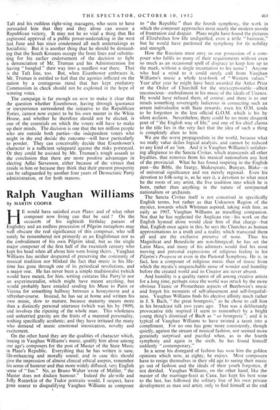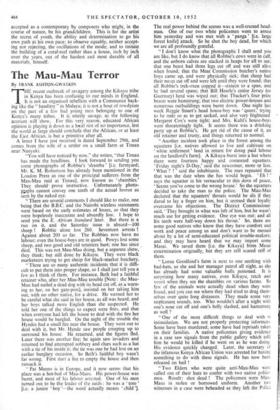Ralph Vaughan Williams
By MARTIN COOPER I E would have satisfied even Plato; and of what other composer now living can that be said ? On the occasion of his eightieth birthday paeans of Englishry and an endless procession of Pilgrim metaphors may well obscure the real significance of this composer, who will surely be remembered not primarily as an Englishman nor as the embodiment of his own Pilgrim ideal, but as the single major composer of the first half of the twentieth century who kept his head when all about him were losing theirs. _ Vaughan Williams has neither despaired of preserving the continuity of musical tradition nor blinked the fact that music in his life- time has gone through one of its periodical revolutions, and a major one. He has never been a simple traditionalist (which would have meant, for him, writing cantatas like Parry's) nor an experimentalist, which might have meant anything, but would probably have entailed sending his Muse to Paris or Vienna for something halfway between a honeymoon and a refresher-course. Instead, he has sat at home and written his own music, slow to mature, because maturity means more than a distinctly personal utterance (which was his by 1909), and involves the ripening of the whole man. This wholeness and unhurried gravity are the fruits of a matured personality, nothing specifically aesthetic; and they have irritated the many who demand of music emotional intoxication, novelty and excitement.
On the other hand they are the qualities of character which, issuing in Vaughan Williams's music, qualify him alone among our age's composers for the post of Master of the State Music in Plato's Republic. Everything that he has written is sane, life-enhancing and morally sound; and in case this should give the impression of almost clinical ethical asepsis, remember his sense of humour and that more widely diffused, very English sense of " fun." No, as Bruno Walter wrote of Mahler, " the Master does not disdain humour." Indeed the ale-wife and Jolly Rutterkin of the Tudor portraits would, I suspect, have gone nearer to disqualifying Vaughan Williams as composer to "the Republic " than the fourth symphony, the work in which the composer approaches most nearly the modern moods of frustration and despair. Plato might have found the pictures of Elizabethan low life undignified, even a trifle " banausic," but he would have pardoned the symphony for its nobility and strength.
How the Russians must envy us our possession of a com- poser who fulfils so many of their requirements without even so much as an occasional spell of disgrace to keep him up to the mark, without a single recantation to his name ! Anyone who had a mind to it could surely cull from Vaughan Williams's music a whole text-book of Western values." Year after year he might have been awarded the Attlee Prize or the Order of Churchill for the unexceptionable—albeit unconscious—embodiment in his music of the ideals of Unesco. He would have refused them, of course; and there is to our minds something sovereignly ludicrous in connecting such an arrant individualist with State rewards; even his. O.M. tends to be forgotten in the less official G.O.M. which is his by silent acclaim. Nevertheless, there could be no more eloquent poet of " the English way of life," and one of his chief claims to the title lies in the very fact that the idea of such a thing is completely alien to him.
We are the worst propagandists in the world, because what we really value defies logical analysis. and cannot be reduced to any kind of an 'ism. And it is Vaughan Williams's unfalter- ing allegiance to the Sancta Civitas, which transcends all other loyalties, that removes from his musical nationalism any hint of the provincial. What he has found inspiring in the English past—the Bible, the liturgy, Shakespeare, Bunyan, Blake—is of universal significance and not merely regional. Even his devotion to folk-song is, as he sees it, a devotion to what must be the roots of any artist, the live tradition into which he is born, rather than anything in the nature of sentimental nationalism or archaism.
The Sancta Civitas itself is not conceived in specifically English terms, but rather as that Unknown Region of. the mystics, towards which Whitman aspired, taking with him, as early as 1907, Vaughan Williams as travelling companion. Not that he has neglected the Anglican rite—his work on the English hymnal alone would clear him of that charge—but that, English once again in this, he sees the Churches as human approximations to a truth and a reality which transcend them all and are the exclusive preserve of none. Thus his Magnificat and Benedicite are non-liturgical; he has set the Latin Mass, and many of his admirers would find his most moving and personal expressions of religious feeling in his Pilgrim's Progress or even in the Pastoral Symphony. He is, in fact, less a composer of religious music than of music from which the mystic's unquenchable sense of wonder and humility before the created world and its Creator are never absent.
And humility is a quality rarest of all among creative artists for a long time, perhaps since the world was struck by the more obvious Titanic or Promethean aspects of Beethoven's music and forgot his moments of self-abasement and self-forgetful- ness. Vaughan Williams finds his elective affinity much rather in J. S. Bach, " the great bourgeois," as he chose to call him in his broadcast talk two years ago. That was a deliberately provocative title inspired (I seem to remember) by a bright young thing's dismissal of Bach as " so bourgeois "; and it is typical of Vaughan Williams to have twisted a taunt into a compliment. For no one has gone more consistently, though quietly, against the stream of musical fashion, nor seemed more genuinely surprised and puzzled when, as in the fourth symphony and again in the sixth, he has found himself suddenly " contemporary."
In a sense his disregard of fashion has won him the golden opinions which now, at eighty, he enjoys. Most composers have to resign themselves in their old age to seeing their music go out of fashion and the ideals of their youth forgotten, if not derided. Vaughan Williams, on the other hand, like the master of the marriage-feast at Cana, has kept his best wine to the last, has followed the solitary line of his own private development as man and artist, only to find himself at the end accepted as a contemporary by composers who might, in the course of nature, be his grandchildren. This is for the artist the secret of youth, the ability and determination to go his own path at his own pace; to observe equably, neither accept- ing nor rejecting, the oscillations of the mode; and to imitate the building of a coral-reef rather than a house, inch by inch over the years, out of the hardest and most durable of all materials, himself.



































 Previous page
Previous page